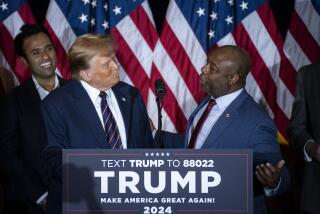The Alabama Senate loss just made Trump’s job a lot harder

President Trump’s margin of support — among the American people and in Congress — was already thin. After Tuesday’s defeat in Alabama, it is decidedly thinner, more than the loss of one Republican senator’s vote would suggest.
The win by Democrat Doug Jones over Republican Roy Moore in one of the nation’s reddest states demonstrated both the limits of Trump’s power to help the Republican Party in key congressional races and the potential for Democrats to rally voters against one of the least popular presidents in modern history.
It will also mean Republicans have one less vote to spare in the Senate, where a 51-49 majority will make passing major legislation even more difficult than it has been in Trump’s rocky first year, absent compromises with emboldened Democrats.
Those Republicans who remain will have more motivation and leverage to decide what’s best for their own political futures, rather than Trump’s, prompting more of them to buck the president or demand major concessions for their votes.
Jones said Wednesday that Trump called him with congratulations and an invitation to the White House. “It was a very gracious call,” Jones said. “I very much appreciated it.”
Trump on Wednesday dismissed criticism that he had backed a flawed candidate, and instead blamed Republicans who spurned Moore after accusations that he had preyed on teenage girls decades ago as a young county prosecutor in his 30s.
Meeting reporters ahead of a lunch with Republicans to discuss tax cut legislation, Trump arched his eyebrows and shrugged his shoulders in apparent frustration as he renewed his argument that concerns about Moore’s character were outweighed by the need for his vote in the Senate. But he acknowledged that some Republicans disagreed.
“Wish we would have gotten the seat,” Trump said. “A lot of Republicans feel differently. They’re very happy with the way it turned out.”
But, he added, “as the leader of the party, I would have liked to have had the seat. I want to endorse the people that are running.”
Trump and Senate Majority Leader Mitch McConnell are hoping to wrap up their tax cut legislation before Jones is sworn in, guaranteeing at least one big victory before the new congressional math sets in. Trump said Wednesday that it’s important to vote on the legislation next week, “not because we lost a seat,” but for the country.
Yet even the tax vote is uncertain in the election’s wake.
Democrats are mounting a protest, demanding that Jones be seated before a final tax vote. They are using the sort of arguments that McConnell used in the past to block Democrats from voting on President Obama’s Supreme Court nominee, Merrick Garland — that the voters’ choice should have an opportunity to weigh in on major decisions. McConnell blocked a vote on Garland for most of a year, arguing that the Senate should wait for a new president to be elected.
Even if McConnell ignores Democratic demands, as is likely, he and Trump will have to close the deal with House Republicans on a bill that is unpopular with voters, adding to the caution of wavering Senate Republicans. Holdouts such as Susan Collins of Maine, Bob Corker of Tennessee and Marco Rubio of Florida could demand more concessions for their support.
Rep. Kevin Brady, the Texas Republican who leads the tax-writing committee, said on Fox on Wednesday morning that Moore’s defeat would not alter the timeline for voting on the tax cuts next week in the House and Senate.
The new political reality could also complicate negotiations over immigration and an essential bill to fund the government and keep it open beyond the holidays.
Senate Minority Leader Charles E. Schumer, a New York Democrat, said he hoped Republicans would “hear the lessons” of the election as he reeled off issues on which Democrats would pitch a fight, including on programs for veterans, opioid addiction and pensions.
Republicans will have to grapple with the political weaknesses exposed by the Moore loss at least through next year’s midterm election campaigns if not beyond. Turnout was notably down among rural voters in conservative, white parts of Alabama, areas where Trump is strongest. Democrats were far more motivated, especially in counties with large black populations and suburbs where white, more educated voters reside.
For Trump, it was a third straight loss, further undermining his aura of influence among Republican voters.
He had first endorsed Luther Strange, the senator appointed to fill the seat Jeff Sessions left to become Trump’s attorney general. When Moore beat Strange in the Republican primary, Trump then endorsed Moore for the general election, even as fellow Republicans, including McConnell, warned that association with Moore would sully the party. Trump also recorded an automated pro-Moore phone call to voters and held a rally on Friday in Florida, near the Alabama border, where he promoted Moore.
Trump also endorsed Republican Ed Gillespie in Virginia’s gubernatorial race, only to have him lose by nearly double digits last month to Democrat Ralph Northam.
Yet Trump, as he typically does, worked to escape blame after the voting was over — with a tweet.
“The reason I originally endorsed Luther Strange (and his numbers went up mightily), is that I said Roy Moore will not be able to win the General Election,” Trump wrote. “I was right!”
Moore had “the deck stacked against him!” Trump added.
Trump said that Moore’s loss justified his initial endorsement of Strange, though he’d privately complained after Strange’s defeat that Republican establishment leaders had persuaded him to back the incumbent. Contrary to Trump’s latest tweet, Strange did not see a big change in support after the president’s endorsement.
Despite his losses, Trump can look to his past Democratic predecessors for precedents suggesting even big setbacks aren’t fatal.
Presidents Clinton and Obama both suffered devastating congressional losses in their first midterm elections — Clinton saw Democrats lose majorities in both the House and Senate, and Obama in the House — only to recover and win reelection two years later. Obama, like Trump now, also took a huge blow at a similar point in his presidency when Republican Scott Brown won a special Senate election in deep-blue Massachusetts after the death of Sen. Edward M. Kennedy.
Still, neither president subsequently enjoyed legislative success as great as in their first year with a Congress controlled by their party.
Jim Manley, a former Democratic Senate leadership aide, predicted Republicans will face “more chaos” in their ranks, adding, “It makes efforts to pass what’s left of their agenda that much tougher.”
Moore’s defeat leaves a major target on Steve Bannon, a former Trump advisor who remains influential in both the White House and conservative media, and the nemesis of McConnell and other party leaders. The head of Breitbart News, Bannon urged Trump to back Moore and campaigned vigorously for him. Mainstream Republicans, who have long disdained Bannon, eagerly lashed out.
“After Alabama disaster GOP must do right thing and DUMP Steve Bannon,” Rep. Peter King, a moderate New York Republican, tweeted. “His act is tired, inane and morally vacuous. If we are to Make America Great Again for all Americans, Bannon must go! And go NOW!!”
Corker, a senator who has been at odds with Trump and Bannon, said he was happy with the Alabama outcome, calling it good for the country. “I would say ultimately, this is probably really good for the Republican Party too,” he added.
One Bannon ally, who would only speak anonymously, called it a “big punch in the face.”
Christopher Ruddy, publisher of a rival conservative website and a friend of Trump’s, said he hopes the loss will persuade the president to discount Bannon’s counsel.
“My advice has always been very consistent: that the president listen to Bannon and do exactly the opposite of what he says to do,” Ruddy said. “He’ll get more accomplished. He’ll get better press, and his approval numbers will go way up.”
Bannon is unlikely to back down in his war on the establishment. Breitbart News led with Trump’s “Deck is stacked” tweet on Wednesday morning and ran a second story blaming “Republican saboteurs” for the loss.
Trump, however, seemed to be coming around to the establishment’s thinking about Moore, suggesting the Alabamian had been a flawed candidate.
“If last night’s election proved anything, it proved that we need to put up GREAT Republican candidates to increase the razor thin margins in both the House and Senate,” he tweeted.
Staff writer Lisa Mascaro contributed to this report.
Twitter: @noahbierman
ALSO
Meet Doug Jones, the law-and-order Democrat who won Alabama’s Senate seat
Democrat Doug Jones wins Alabama Senate seat, but Roy Moore won’t concede
Trump’s lawyers want second special counsel as Republicans turn up the heat on Mueller investigation
UPDATES:
1:50 p.m.: This article was updated to add a quote from Doug Jones.
12:30 p.m.: This article was updated with additional reaction and analysis.
8:55 a.m.: This article was updated with additional analysis.
This article was originally published at 8:30 a.m.
More to Read
Get the L.A. Times Politics newsletter
Deeply reported insights into legislation, politics and policy from Sacramento, Washington and beyond. In your inbox three times per week.
You may occasionally receive promotional content from the Los Angeles Times.







